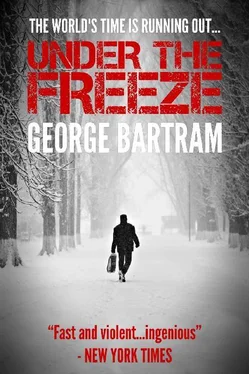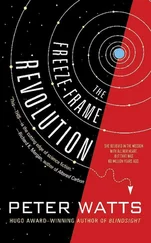Tarp shook himself like a dog who has just climbed out of the water. That won’t do . That won’t do at all .
He went to the computer for facts again and ran Schneider’s name, but got no more than he had learned in Buenos Aires.
QUERY: KINSELLA, JAIME.
ALL NEW DATA: BORN JUNE 1947/ MARRIED THREE CHILDREN/ RES BUENOS AIRES ARGENTINA/ ASSISTANT DEPUTY DIRECTOR FOR FOREIGN JOURNALISTS, BUREAU OF NEWS AND INFORMATION/ HOLDS CURRENT RANK CAPTAIN ARGENTINE AIR FORCE SPECIALIST INTELLIGENCE/ ACTIVE DUTY 1968-77 INCLUDING AIR INTELLIGENCE SCHOOL, WASHINGTON D C./ NO KNOWN CONNECTIONS POLITICAL GROUPS ARGENTINA BUT INVESTIGATING/ SOURCE: MR. SMITH
Tarp wondered how deep the split between the Argentine navy and air force had become since the Falklands war. Was it deep enough for the two services to be shooting at each other?
QUERY: POPE-GINNA, ADMIRAL , he asked it.
The machine began to give him information at a remarkable rate. He turned on the printer and let it give him the data that way, so that he could have time to absorb it. The printer chattered like a self-absorbed animal, and a tongue of paper was extruded, to fold over on itself and wait obediently for his hand.
POPE-GINNA, ANTHONY MARCUS AURELIUS, it said.
BORN PORTSMOUTH ENGLAND AUGUST 1904/ COMMISSIONED ROYAL NAVY 1923/ FIRST POSTING AS
Tarp’s eyes skimmed the paper, passing over a remarkably detailed summary of a naval career. A fact buried in the middle of it caused him to stop, then to backtrack.
COMMANDING OFFICER LIGHT CRUISER HMS LOYAL 1943-44 AND BLUE ATTACK SQUADRON SOUTH ATLANTIC HQ FALKLAND ISLANDS PAREN 4 DESTROYERS, 1 LIGHT CRUISER, SUPPORT VESSELS PAREN/ PURSUED AND SANK GERMAN CRUISER PRINZ VON HOMBURG WATERS SOUTH-SOUTHWEST GEORGIA ISLANDS 1944/ PERSONAL CITATION/ UNIT CITATION/
Then there were more details, and:
TO ADMIRALTY OFFICE FOR PLANNING AND PREPARATION 1945/ TO SUBSURFACE TRAINING CENTER BRISTOL HAVEN BY OWN REQUEST 1946/ COMPLETED 1947/ STAFF EXEC ATLANTIC UNDERSEA COMMAND 1947-49/ TO ADMIRALTY OFFICE FOR UNDERSEA RESEARCH 1949-51/ REQUESTED RETIREMENT 1952/
Tarp skipped a summary of Pope-Ginna’s London life that included his clubs and his wife’s gardening society and jumped to:
ARGENTINE RESIDENT 1955 TO PRESENT/ ADVISER ARGENTINE GOVT MARINE RESEARCH AND FISHERIES/ MEMBERSHIP BOARDS OF BANCO FIDUCIA BUENOS AIRES/ SCHNEIDER AGRI-CHEM INC/ SCHNEIDER AGRO-INDUSTRIA/ CORTILE DEL DEVELOPMENTS MERIDIONALE/ ANGLO-ARGENTINE EXPLORATION COMPANY/ NAVOLINEAS ARGENTINAS/ INTELL REPORT MAKES HIM ACTIVE MEDIATOR GB-ARGENTINE FALKLANDS DISPUTE/
Tarp stared at the sheets, over which the letters marched like neat bird tracks.
He called up the map of the tip of South America and the Antarctic Peninsula again.
LOCATE: SINKING OF GERMAN CRUISER PRINZ VON HOMBURG.
A light pulsed on the screen, just at the edge of the drift ice. At the top of the screen the words ESTIMATED LOCATION ONLY appeared.
LOCATE: POLYNYA.
A dotted circle appeared within the line of drift ice. The estimated location of the sunken German cruiser was about two hundred miles outside the circle, north and west.
QUERY: WAS THERE A POLYNYA IN 1944?
NO DATA.
QUERY: EXACT LOCATION PRINZ VON HOMBURG?
NO DATA.
Tarp wanted to argue with the machine.
QUERY: SOURCE FOR ESTIMATED LOCATION PRINZ VON HOMBURG?
ROYAL NAVY HISTORY OF WORLD WAR TWO.
That made no sense. The Royal Navy did not deal in estimated locations. The war had been over for a generation, so there seemed no reason to classify the matter. Surely, he thought, they knew where their ship was when it sank a major German ship?
Of more interest, however, was just what the German ship had been doing at the edge of the Antarctic drift ice — and so close to an area that might now interest Soviet and Argentine submarines.
I believe I ought to visit London .
Tarp took out a pack frame and put a change of clothes and food for three days into it. He put both the French and the Canadian identifications in, and the little cigarette lighter with the two .22 rounds. He put in survival gear — matches and fire starter; two reflective, ultralight plastic blankets; a light tent; a subzero down sleeping bag. He propped the pack frame next to the door with a pair of snowshoes.
That night he sat up with the computer and a glass of Laphroaig, but nothing more could be coaxed from either the machine or his brain. Yet he felt better. Buenos Aires had become a puzzle rather than a pain. He went to bed with the wind sighing against the cabin wall behind his head and snow grating against the window shutters like sand.
When he awoke in the dark of the morning, it was quiet.
Snow’s over .
He fried the rest of the biscuits in canned butter and ate them greedily with the rest of the jam, washed his few dishes, and propped them in the steel sink as if he would be back for lunch. He poured antifreeze into the drains again and turned off the computer. Electric heating units would keep its vital systems ready to start again.
The sun was hanging in the black trees again when he went out, but it was not obscured by clouds now, and above it the sky was a thin yellow and, overhead, cold blue. The day would be bright, bitter cold, and windless. He put hrs feet in the snow-shoe harnesses and put the pack frame on his back and went down across his clearing and through his woods, down the river bank to the frozen water, to pick his way among boulders that in the summer made the river a peril to canoes.
He climbed the other bank and headed into the woods, in Canada now. He knew the land here. That night he camped in the hollow under a canopy of trees, and the next night he spent in a motel outside Fredericton, having come the last twenty-three miles in an oil truck. He sent all his gear back to a Canadian border town marked Hold Until Spring. They understood that sort of thing there.
That afternoon he caught a plane to Montreal, and from there he flew to London.
There were hotels above the British Museum where nobody knew him and nobody was likely to look for him. They accepted Mr. Roger Murdock and his Canadian passport without question, and, if the hotel was different from the New Monroe, it was discreet and comfortable enough.
He walked down toward the museum, found a coin telephone box, and called a number at Whitehall. The voice at the other end was very young, very tight, and very officious — the voice of an ambitious boy whose job was to protect his master.
“Seven nine five, Kennington speaking.”
“Mr. John Carrington, please.”
“Who shall I say is calling, please?”
“An American friend.”
“I’m afraid I really can’t consider any request to speak to Mr. Carrington without knowing who is calling, sir.”
“My name is Friend. Mr. American Friend.”
The boy never missed a beat but said in a voice as smooth as butter sliding down a warm skillet, “Mr. Carrington is in conference at the moment, I’m afraid.”
“Please tell him that Mr. Friend called, then.”
“Certainly.”
“Thank you.”
“Thank you .”
“Good-bye.”
“Good-bye to you .”
Tarp could picture him — twenty-two or -three, terribly proper, got up in a diplomat’s costume. He could be prime minister one day, if he proved both ruthless and lucky.
Tarp pulled at his lower lip, trying to remember a telephone number. When he could not get it he swung up the directory and began to leaf through the Bs. He stabbed with a finger. “Bentham!” It had been eleven years, but he still disliked forgetting such details. He dialed and put in another coin and held more ready.
Читать дальше












